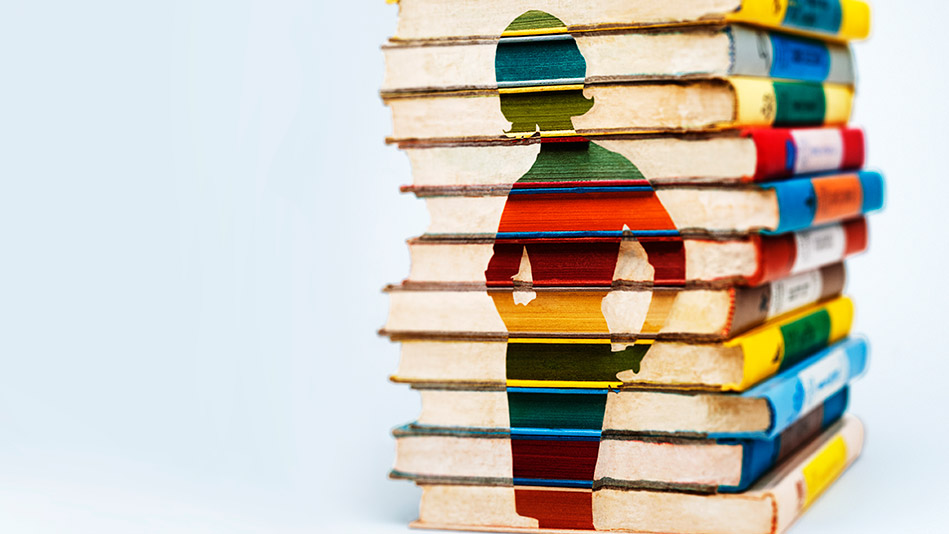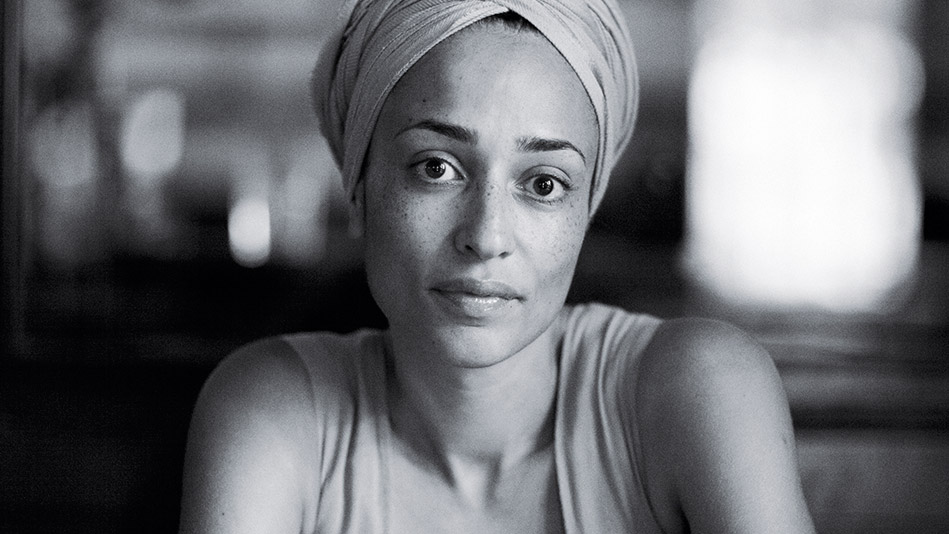Zadie Smith offers an ode to bibliomania, a happy disorder nicely accommodated by this forgiving time of year.

Illustration: Thomas Allen
Quite often I am asked to recommend, as a practice, the habit of "reading." I like to do this, though I always feel a little phony. To recommend something implies that its presence in your life is a positive choice, like playing tennis or avoiding gluten. For me, being a reader, in summer or at any other time, isn't a "lifestyle choice." Rather, I made the choice—if that's what it was—so long ago, it has taken on an inescapable character in my mind. I think that if I were a very good swimmer, I would be proud to be so, but being proud of being a reader, in my case, is like being proud you have feet. I don't feel much pride when, on the way to somebody's house for dinner, I stuff several books into my handbag for...well, for what? Can I really not manage a brief subway ride without textual support? Is that normal? Are there other people who, when watching a documentary set in a prison, secretly think, as I have, Wish I had all that time to read?
What I'm describing is a condition that might be termed "pathological reader syndrome." My acquisition and digestion of books is, to be frank, absurd. Just get a Kindle, everyone advised me a few years ago. Yet here I am, packing for a short flight between London and Belfast, with my Kindle, certainly, but also with four or five hardback books jammed into my hand luggage, just in case. Just in case we happen to fly through a wrinkle in time in which an hour expands to accommodate infinity.
While I'm not sure I can recommend living this way, I can say that if you are similarly afflicted, summer is your season: The beach is one of the few places pathological readers can pass undetected among their civilian cousins. Of course, summer calls for a particular kind of book. In August, in a hammock, I find that one sentence must flow unobstructed to the next, and the people I'm reading about should struggle and die and confess their eternal love for one another. Tolstoy is excellent for hammock reading, especially Anna Karenina, War and Peace (skipping over the essays at the end) and any of his shorter stories. Flaubert's Madame Bovary is, likewise, utter heaven. More recently I forgot I had a life while reading of lives torn apart by the Biafran war in Chimamanda Ngozi Adichie's Half of a Yellow Sun. The epic inaction of our summer holidays is perhaps what makes them suitable for the reading of epics, especially those set in times of war. When I am doing nothing but watching a 4-year-old dig a large hole in the sand, it's nice to know that somewhere else the Russian army is advancing. I once went to the Bahamas with my mother and brothers, but in truth I went on holiday with Daniel Deronda. A decade later, I still remember Eliot's sentences better than the charms of the company.
What I'm describing is a condition that might be termed "pathological reader syndrome." My acquisition and digestion of books is, to be frank, absurd. Just get a Kindle, everyone advised me a few years ago. Yet here I am, packing for a short flight between London and Belfast, with my Kindle, certainly, but also with four or five hardback books jammed into my hand luggage, just in case. Just in case we happen to fly through a wrinkle in time in which an hour expands to accommodate infinity.
While I'm not sure I can recommend living this way, I can say that if you are similarly afflicted, summer is your season: The beach is one of the few places pathological readers can pass undetected among their civilian cousins. Of course, summer calls for a particular kind of book. In August, in a hammock, I find that one sentence must flow unobstructed to the next, and the people I'm reading about should struggle and die and confess their eternal love for one another. Tolstoy is excellent for hammock reading, especially Anna Karenina, War and Peace (skipping over the essays at the end) and any of his shorter stories. Flaubert's Madame Bovary is, likewise, utter heaven. More recently I forgot I had a life while reading of lives torn apart by the Biafran war in Chimamanda Ngozi Adichie's Half of a Yellow Sun. The epic inaction of our summer holidays is perhaps what makes them suitable for the reading of epics, especially those set in times of war. When I am doing nothing but watching a 4-year-old dig a large hole in the sand, it's nice to know that somewhere else the Russian army is advancing. I once went to the Bahamas with my mother and brothers, but in truth I went on holiday with Daniel Deronda. A decade later, I still remember Eliot's sentences better than the charms of the company.

Photo: Linda Brownlee/Corbis Outline
I have also experienced much summer reading joy sinking into the epic lives of real people. Adrian Nicole LeBlanc's Random Family: Love, Drugs, Trouble, and Coming of Age in the Bronx gave me one of the greatest, most immersive summer reading experiences of my life. This summer I hope to read Common Ground: A Turbulent Decade in the Lives of Three American Families by J. Anthony Lukas, which gives us Boston in the '60s and '70s, with all its racial and political turmoil. I say "hope" because all reading now, pathological or otherwise, is dependent on my two children giving me time to do it. Epics begin to look daunting when you're measuring your time in teaspoons. For this reason, among many others, I do not sniff at true crime, which you can read even while your children are talking to you. And the grandfather of that genre, Truman Capote's In Cold Blood, is still, to me, the finest.
My name is Zadie Smith, and I am a 38-year-old pathological reader. I would like to say in my defense that I don't really get the appeal of YOLO. I live many times over. Hypothetical, subterranean lives that run beneath the relative tedium of my own and have the power to occasionally penetrate or even derail it. I find it hard to name the one book that was so damn delightful it changed my life. The truth is, they have all changed my life, every single one of them—even the ones I hated. Books are my version of "experiences." I'm made of them. But every summer I hope to take a book to a beach and pretend that it's only an occasional thing, a seasonal indulgence, which will be put down come September, as I return, like any civilian, to real life.
Zadie Smith is the author of White Teeth, The Autograph Man, On Beauty, NW and the essay collection Changing My Mind.
My name is Zadie Smith, and I am a 38-year-old pathological reader. I would like to say in my defense that I don't really get the appeal of YOLO. I live many times over. Hypothetical, subterranean lives that run beneath the relative tedium of my own and have the power to occasionally penetrate or even derail it. I find it hard to name the one book that was so damn delightful it changed my life. The truth is, they have all changed my life, every single one of them—even the ones I hated. Books are my version of "experiences." I'm made of them. But every summer I hope to take a book to a beach and pretend that it's only an occasional thing, a seasonal indulgence, which will be put down come September, as I return, like any civilian, to real life.
Zadie Smith is the author of White Teeth, The Autograph Man, On Beauty, NW and the essay collection Changing My Mind.




